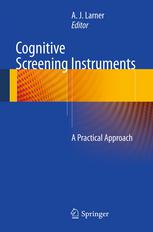

Most ebook files are in PDF format, so you can easily read them using various software such as Foxit Reader or directly on the Google Chrome browser.
Some ebook files are released by publishers in other formats such as .awz, .mobi, .epub, .fb2, etc. You may need to install specific software to read these formats on mobile/PC, such as Calibre.
Please read the tutorial at this link: https://ebookbell.com/faq
We offer FREE conversion to the popular formats you request; however, this may take some time. Therefore, right after payment, please email us, and we will try to provide the service as quickly as possible.
For some exceptional file formats or broken links (if any), please refrain from opening any disputes. Instead, email us first, and we will try to assist within a maximum of 6 hours.
EbookBell Team

4.3
88 reviewsCognitive Screening Instruments: A Practical Approach provides a practical and structured overview of some of the most commonly used and easily available cognitive screening instruments applicable in the outpatient clinic and bedside setting. Dementia and cognitive disorders are now recognised as an increasing public health problem, both in terms of patient numbers and cost, as populations age throughout the world. Despite this, many patients with dementia never receive a formal diagnosis, with implications for their appropriate care and management. Diagnostic tests which identify cases of dementia therefore have an important role.
Expert authors from around the world equip the reader of Cognitive Screening Instruments: A Practical Approach with clear instructions on the usage of each screening instrument, its strengths and weaknesses, the time required for administration, and rules on scoring, such as how to correct for variations in the patient’s age or education, and suggested cut-off scores.
Cognitive Screening Instruments: A Practical Approach is a handy, illustrated guide and a valuable diagnostic aid for practitioners working closely with patients with dementia and mild cognitive impairment. This volume will be of use both to clinicians and to professionals in disciplines allied to medicine who are called upon to assess patients with possible cognitive disorders, including neurologists, old age psychiatrists, neuropsychologists, primary care physicians, dementia support workers, and members of memory assessment teams.